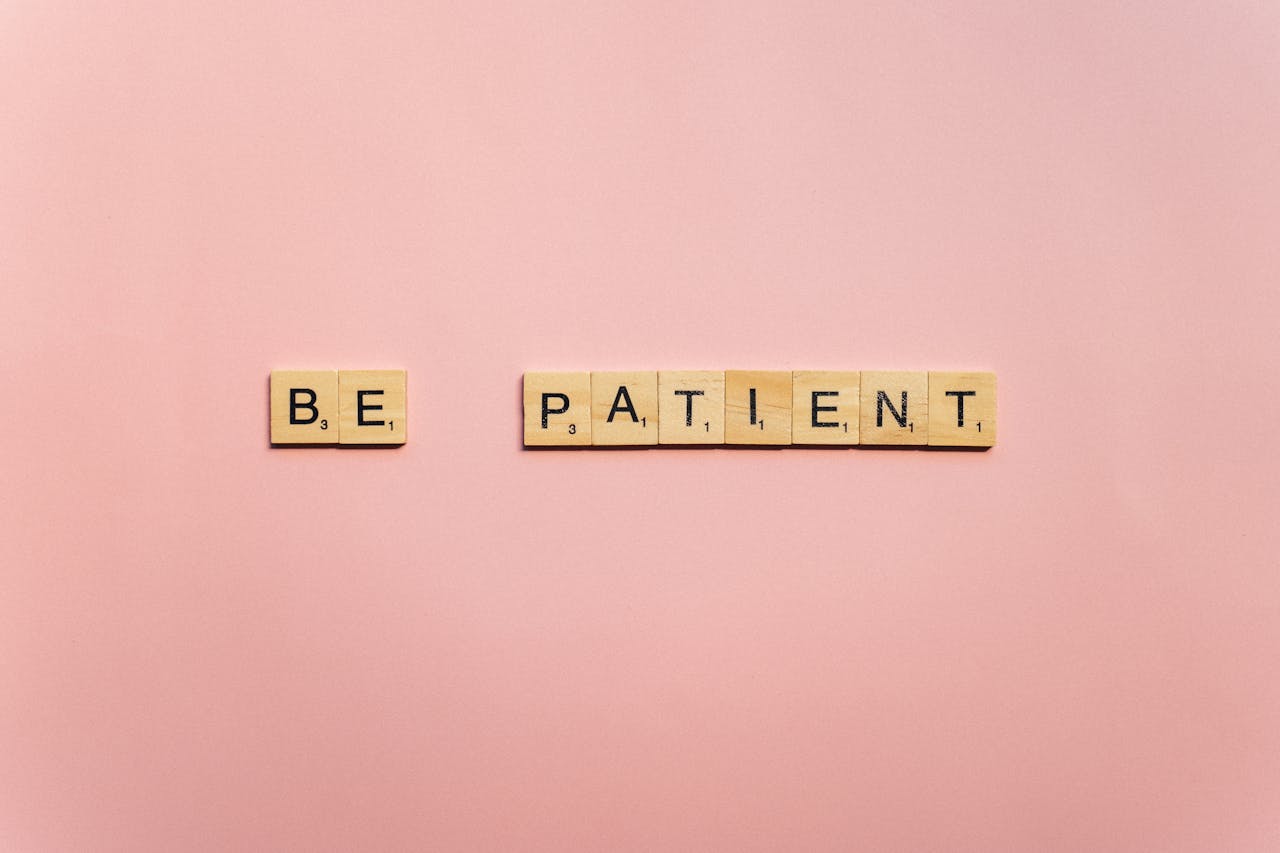Patience is one of those things people often talk about, but what does it really mean? Technically speaking, how to develop patience requires more than just waiting.
It’s like having a calming superpower that helps you stay collected even when things aren’t going your way. It’s about staying calm, maintaining your perspective, and acting with intention.
Ever wonder why some people seem naturally patient? Well, science jumps in here!
Patience isn’t just about willpower. It’s a blend of psychological factors and sometimes even biological ones. Our brains process waiting and anticipation in unique ways, thanks to hormones and neural pathways. Understanding this can help develop more patience.
Patience pays off, literally. People who exercise patience tend to have better mental health, form robust relationships, and often experience career success. Plus, if you can keep impatience at bay, the reduced stress might even help you live longer. Knowing these perks makes developing patience worth the effort.
A lot of people mistake patience for passivity. It’s not about just sitting back and doing nothing.
Patience involves active engagement and thoughtful responses. It’s proactive, not reactive, making it an essential skill in today’s fast-paced world.
How To Develop Patience — The Immediate Rewards of Cultivating Patience
“Have patience. All things are difficult before they become easy.” — Saadi ––
Picture this: You’re stuck in traffic, feeling your stress levels rise because you’re running late. With a practiced sense of patience, you breathe, relax, and notice how the sky looks rather than focusing on the clock.
Stress reduction is one of the first benefits you might find when you start developing patience. It acts like a buffer against anxiety, helping you handle stressful situations with grace.
Patience also works wonders in relationships. Who doesn’t love being around someone who listens more and reacts less?
Patience allows you to understand others better by encouraging empathy and thoughtful responses. Whether it’s with family, friends, or colleagues, patience can help build trust and respect in your interactions.
Decision-making gets a boost, too. When you’re not rushing to choose hastily, you’re more likely to take in all the factors and make smarter choices. This can lead to better problem-solving skills and helps with those little daily decisions that can sometimes feel overwhelming.
There’s more! Folks who harness patience might find their education and careers benefiting, too. Patience helps you stay persistent with your studies or work, leading to improved performance and outcomes.
Financially, patience can guide you in making wise investment decisions and saving for the long-term, rather than blowing it all for short-term thrills. It’s a mindset shift that pays off in the long run.
The ABCs of Developing Patience: Attitude, Balance, and Commitment
“Patience and perseverance have a magical effect before which difficulties disappear and obstacles vanish.” — John Quincy Adams —
Having a positive attitude is the cornerstone of becoming patient. It’s about shifting your mindset from seeing delays only as annoyances to viewing them as opportunities to practice staying calm. This change can be like turning on a light, showing that you’re in control, not the circumstances.
Balance plays a massive role, too. By setting realistic goals and managing expectations, you can prevent frustration from creeping in. It’s all about pacing yourself; not everything has to be resolved instantly. When you balance your to-do list and don’t exaggerate your timelines, it’s easier to accept delays without losing your cool.
Patience isn’t a one-off deal; it requires commitment. You need long-term strategies and the determination to see them through.
Maybe start with baby steps and celebrate small wins. This steady approach helps you gradually incorporate patience into your life without feeling overwhelmed.
The funny part is, practicing patience also builds more patience. Just as exercising builds muscle, consistently working on patience grows your ability to remain calm, even in the face of adversity. Keeping the focus on progress rather than perfection is vital here. It’s a journey, not a race.
How To Develop Patience — Practical Techniques to Enhance Your Patience
“I have seen many storms in my life. Most storms have caught me by surprise, so I had to learn very quickly to look further and understand that I am not capable of controlling the weather, to exercise the art of patience and to respect the fury of nature.” — Paulo Coelho —
Here are a few ideas on how to develop patience.
Mindfulness is like magic for boosting patience. By staying present and fully experiencing each moment, you can train yourself to respond more thoughtfully. Even a few minutes of meditation daily can make a significant difference.
Breathing exercises work wonders when you’re on edge. Deep breaths help you regain control and center your thoughts. Next time you’re feeling impatient, try inhaling deeply, holding it for a few seconds, and then exhaling slowly. It’s a quick stress-buster!
Ever heard of delaying gratification? It’s about resisting the temptation to take an immediate reward, opting instead for a more satisfying one later. By practicing also be a game-changerin small ways—like skipping that extra snack or saving money—you’ll find your patience muscle growing stronger.
Visualization can also be a game-changer. Imagine yourself handling a frustrating situation calmly and clearly. Picture the details: the environment, your responses, and the ease on your face. This mental rehearsal can prepare you for real-life challenges, making it easier to maintain patience when it counts.
Challenges and Solutions in Practicing Patience
“Never cut a tree down in the wintertime. Never make a negative decision in the low time. Never make your most important decisions when you are in your worst moods. Wait. Be patient. The storm will pass. The spring will come.” — Robert H. Schuller —
When you’re trying to become more patient, recognizing what triggers your impatience is the first step. Everyone has those moments when impatience flares—maybe it’s traffic jams or waiting for replies. Identifying these triggers can help you anticipate them and respond better.
Time management is crucial for patience. By organizing your day more effectively, you can reduce stress and avoid situations that might test your patience. When you know what’s in store and feel prepared, you’re less likely to get bent out of shape when things go sideways.
Empathy can transform how you approach patience. Taking a moment to listen actively and understand other perspectives not only fosters patience but strengthens your relationships too. If you hit a bump in your day, remember to consider where others might be coming from.
Hearing about real-life applications can inspire. Think of those individuals who have faced significant hurdles patiently and emerged stronger. Their stories show that patience isn’t just about waiting but engaging thoughtfully. These examples can offer insights and boost your resolve when learning how to develop patience when it seems elusive.
How To Develop Patience — Integrating Patience into Daily Life for Long-term Benefits
“Good character is not formed in a week or a month. It is created little by little, day by day. Protracted and patient effort is needed to develop good character.” — Heraclitus —
When learning how to develop patience it requires consistency and support.
Building a support system helps significantly. Surround yourself with people who encourage patience and set a great example. When you’re around patient individuals, it’ll naturally influence your behavior and reinforce your commitment.
Technology can be an ally in your patience journey. Use apps and tools to remind you of your patience goals and track your progress. This digital diary of sorts can keep your motivation high and make achievements more visible and rewarding.
Regular reflection is powerful. By taking time to reflect on your experiences, you gain feedback on what’s working and where you might need to tweak your approach. Reflection helps cement patience as part of your character, shifting it from something you strive for to something you embody.
The Transformative Power of Patience: A Personal Journey
“Only those who have patience to do simple things perfectly ever acquire the skill to do difficult things easily.” — James J. Corbett —
Patience isn’t just a virtue; it’s a powerful ally in transforming your life. I remember times when impatience got the better of me. With commitment and practice, I’ve seen how patience can change the way I deal with everyday challenges.
Reflecting on past instances of impatience highlights areas for growth. It’s not just about nitpicking past mistakes but re-evaluating them through a lens of understanding and growth. This reflection can be a catalyst for more mindful and patient responses in future situations.
Patience isn’t something you achieve overnight; it’s a lifestyle. Like any other skill, the more you practice, the better you get. Committing to a life where patience is a cornerstone can lead to numerous personal and professional benefits.
Imagine a world where more people were patient—not just individually but globally. Encouraging patience on a larger scale could mean more empathetic societies, improved communication, and collaborative problem-solving.
Your journey toward how to develop patience might impact more than just your day-to-day life. It has the potential to inspire those around you, fostering environments where patience becomes contagious and valued. This shift can bring profound improvements to broader social and cultural contexts.
In Peace & Love,
Joseph Stasaitis





I really enjoyed your reminder that patience is more than just passively waiting — it’s an active choice to stay calm and intentional, which you described as a ‘calming superpower’. I like how you tied it to tangible benefits like lower stress levels, better relationships and smarter decision‑making, it makes the practice feel worthwhile. Your ABCs of patience – attitude, balance and commitment – were great reminders that we can reframe delays as opportunities and set realistic expectations instead of trying to do everything at once. I’ve been experimenting with a simple breathing exercise whenever I feel myself getting impatient in traffic, and it really helps me reset instead of honking and stressing out. I also thought the tips on delaying gratification and visualising yourself handling a tough situation calmly were surprisingly practical, and something I could incorporate when I’m tempted to buy something I don’t need. Do you have any favourite apps or techniques for time management and identifying your personal impatience triggers? Thanks for the thoughtful article – I’m inspired to build patience like a muscle rather than expecting instant progress.
Thanks so much for your comments and thoughts on this subject. I do not use any apps but have trained myself to stay present and appreciate the moment. This settles things down. Best, Joseph
Hello Joseph,
I have always considered myself as pretty patient! At some things I am extremely patient, but others, not so much! This post really opened my eyes to how much deeper patience goes than simply “waiting things out.” I appreciated how you framed it as an active skill—something that combines mindset, balance, and consistent practice rather than passivity. The idea that patience reduces stress while strengthening relationships and decision-making really hit home for me.
I especially liked the practical techniques you shared—breathing, mindfulness, and even delaying gratification in small ways. Those are simple steps that make patience feel more approachable rather than overwhelming.
Your reminder that patience is a journey, not a destination, was powerful. I’m walking away with a renewed perspective on how practicing patience can transform not only my own life but also the way I interact with others. Thank you for this inspiring and practical guide!
Thanks again,
Mark
Thank you< Mark, for your thoughts and insights. Very much appreciated. Best, Joseph
Hi Joseph,
This is such an inspiring article for anyone who is practicing their leadership, personal growth and influencing skills.
it takes patience to attract leaders and people with a strong character.
Leaders have not yet developed the same level character as a highly effective leader could do with reading this article, so AI am going to share this with my team.
We all need to work on ourselves every day to develop the patience of a highly effective leader.
Thank you for sharing and keep up the great work on your site.
All the best,
Tom
Thank you, Tom. I appreciate your relevant insights. All the best, Joseph
This was such a thoughtful breakdown of patience—I love how you framed it as an active skill rather than just waiting around. The idea that patience reduces stress while strengthening relationships and decision-making really resonated with me. I especially liked the ABCs approach (Attitude, Balance, Commitment)—simple but powerful. Great reminder that patience isn’t passive, it’s a daily practice that pays off in so many areas of life!
Thank you, Teresa. Your thoughts are very much appreciated. Best, Joseph